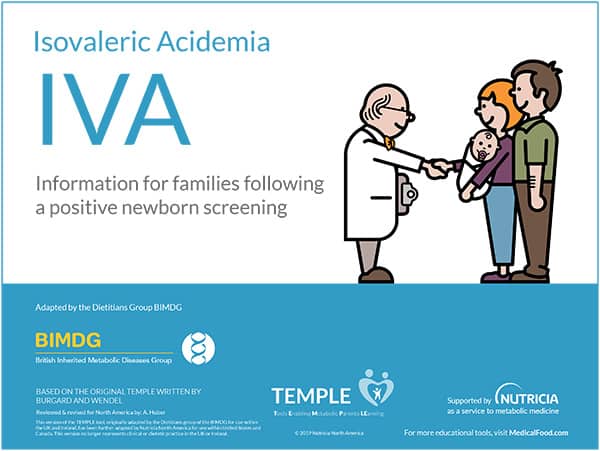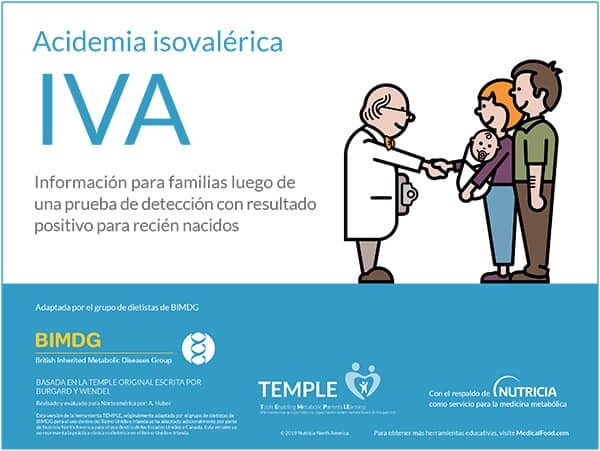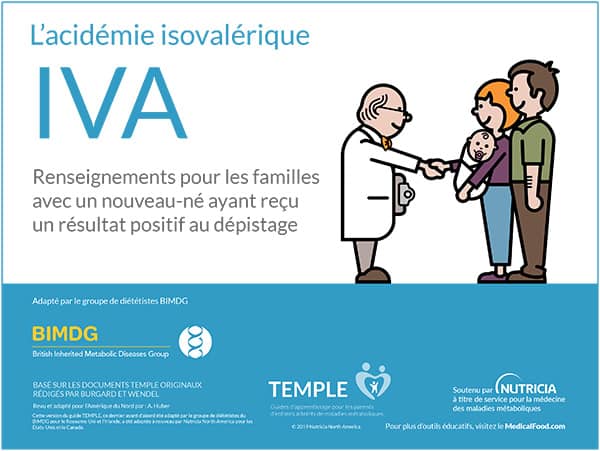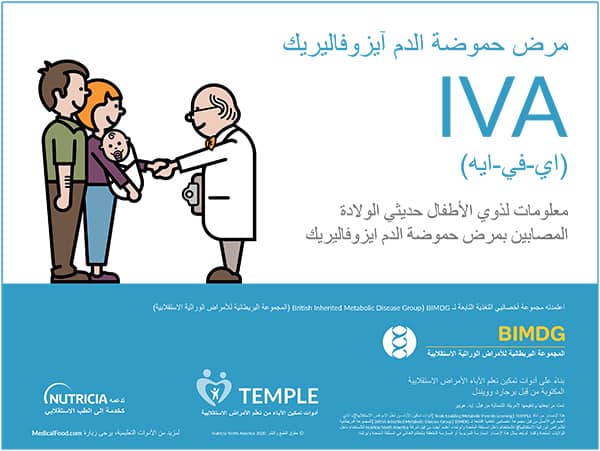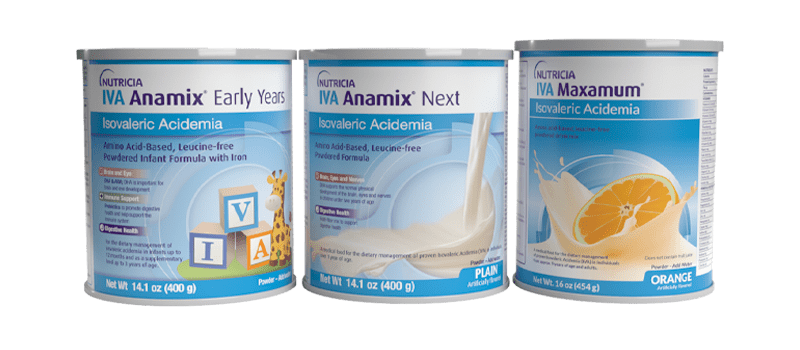IVA - Isovaleric Acidemia Education & Support
Isovaleric acidemia (IVA) is an inherited, genetic disorder. IVA occurs when there is a defect in an enzyme that helps break down protein from food. The name of the enzyme is isovaleryl-CoA dehydrogenase (IVD).
Protein is made up of smaller units called amino acids. Amino acids are important to build muscle and other body tissues for normal growth. Any extra amino acids are normally broken down to produce energy. In IVA, one of the amino acids cannot be broken down in the body. This amino acid is leucine. When someone with IVA eats too much protein from food, does not get enough calories or becomes ill, blood levels of leucine increase and so do levels of isovaleric acid, a toxic byproduct. Isovaleric acidemia gets its name because of the buildup of isovaleric acid that can occur in the blood of people with this disorder. Isovaleric acid has a distinct odor of sweaty socks, which can be present when levels of isovaleric acid are higher than normal.
Medical problems associated with IVA can range from very mild to life-threatening. High levels of leucine and isovaleric acid can cause poor feeding, vomiting, severe weakness (lethargy), seizures and coma in infants. If not managed aggressively, IVA can be fatal. Long term problems can include poor growth, slow development and learning problems.
Finding out that your child has IVA can be overwhelming. Fortunately, nutrition management is available to help prevent many of these problems. Take comfort in knowing that your metabolic healthcare team can provide you with the best advice to help manage IVA.
Incidence, Genetics and Newborn Screening
IVA is a rare disorder that occurs in about 1 in every 250,000 births.
IVA is inherited as a “recessive disorder.” In recessive disorders, both the mother and father are “carriers,” and they do not have any symptoms of the disorder. With each pregnancy there is a 1 in 4 (25%) chance that the infant will be affected. A genetic counselor can help explain the inheritance of IVA and the risks to future infants. IVA can be screened for at birth through a simple blood test. For details on newborn screening (NBS) in the US, visit https://newbornscreening.hrsa.gov/your-state; for information on NBS in Canada, visit https://www.raredisorders.ca/.
There is no cure for IVA, but it can be managed with a modified diet, medications and in some cases special medical formulas specifically designed for persons with IVA. The modified diet for IVA is low in leucine. It is important that an individual with IVA continues with management as directed by their healthcare professional.
A medical formula can be a very important part of the diet for IVA. The protein source in IVA medical formulas is individual amino acids, but leucine is left out. This allows a person with IVA to get enough protein without the parts of protein that can be harmful. Medical formulas may also provide calories, vitamins and minerals the body needs for normal growth.
To provide just enough leucine that a person with IVA needs, a limited amount of natural protein-containing foods are allowed in the diet. For infants, breast milk or regular infant formula is given in precise amounts. As the baby grows and can eat solid foods, the breast milk or regular infant formula will be removed from the diet, and leucine will come from foods instead.
Since all foods with protein contain leucine, individuals with IVA must limit their intake of certain foods high in protein. These may include milk and dairy products, meat, poultry, fish, eggs, beans, nuts and peanut butter. Regular breads and pastas may be allowed in small amounts, but special low protein versions of these foods are often used instead to allow for more choices in the diet and less concern for eating too much protein. Vegetables and fruit are allowed. Foods may have to be weighed or measured to ensure that excess protein is not eaten.
Nutricia North America provides a range of medical formulas as well as low protein foods. Please contact us for more information. Your dietitian will help you decide which products are best.
In addition to a modified diet, those with IVA may also be given L-carnitine and glycine. Both of these components can help prevent the toxicity associated with elevated isovaleric acid levels.
During Illness
During illness or after an injury, the body increases the breakdown of protein stores. This can raise the levels of leucine and isovaleric acid in the blood and lead to serious medical problems. Early signs that require immediate medical attention include vomiting, excessive sleepiness, coordination problems and/or changes in mental status. During any illness, it is very important to notify your metabolic clinic immediately. Often, the diet is adjusted to either remove or decrease leucine intake and increase calories. This can help slow the breakdown of protein stores. Medications may also be adjusted during illness. Your clinic will give you an emergency letter – if you notice symptoms of high isovaleric acid levels, take this letter with you to the emergency room. During an illness, a hospital stay may be needed.
| Screening Technologies and Research in Genetics (STAR-G) |
| Newborn Screening in Your State (US) |
| Organic Acidemia Association |
| Canadian Organization for Rare Disorders |
Nutricia North America would like to thank Sandy van Calcar, PhD, RD, Oregon Health & Science University for her consultation.
IVA Education
Tools Enabling Metabolic Parents Learning (TEMPLE)
This easy-to-understand education booklet and video are for families affected by a diagnosis of IVA. The book and video share the basics of the disorder and the genetics behind IVA.
Click on the booklet to view and download in your preferred language.
Low Pro Living Support
We have a library of information to help support families like yours throughout the various stages of life's journey. From big moments, like starting college to little ones like what to eat for dinner, we have tips and ideas to help you along the way.

